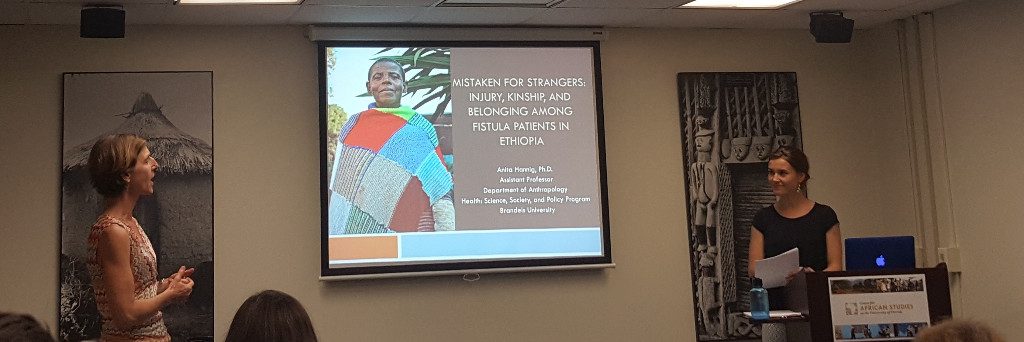 On Friday October 21st, Anita Hannig gave a Baraza presentation titled “Mistaken for Strangers: Injury, Kinship, and Belonging Among Fistula Patients in Ethiopia.” Dr. Hannig is Assistant Professor of Anthropology at Brandeis University. The talk focused on obstetric fistula, a condition which develops as the result of an obstructed delivery, as it affects Amhara women in Ethiopia.
On Friday October 21st, Anita Hannig gave a Baraza presentation titled “Mistaken for Strangers: Injury, Kinship, and Belonging Among Fistula Patients in Ethiopia.” Dr. Hannig is Assistant Professor of Anthropology at Brandeis University. The talk focused on obstetric fistula, a condition which develops as the result of an obstructed delivery, as it affects Amhara women in Ethiopia.
About one million women are affected by obstetric fistula globally, a majority of which live in sub-Saharan Africa. Obstetric fistula is a condition where, as the result of an obstructed delivery, a hole develops between the vagina and either the bladder or rectum and typically requires surgery to repair. Hannig’s research investigates the experiences of Amhara women affected by this condition, and particularly the roles of the clinics, community, kin, and family on these women’s lives. First and foremost, Hannig’s talk presented the difficulties women face after an obstructed delivery results in an obstetric fistula. In the majority of cases, the baby does not survive. The women face difficulty in integrating back into their normal lives for a number of reasons: the level of care required; shame felt if parents are the ones to care for the woman; the possible effects on a woman’s future fertility; possible increased marital stress; these conditions are largely unknown and often women are embarrassed to be found out; women’s social lives are typically restricted because of fears that they will leak or smell when outside their own home, and so on.
Secondly, however, Hannig finds that the development narrative surrounding this condition is not representative of Amhara womens’ experiences. Exploring the concepts of kinship and family in Amhara, care and providing for others’ bodily well-being is critical to the understanding of kin. Women were not typically ostracized by their families or, when their condition was known, by their communities. Hannig links the misleading development narrative to a harmful, yet common, narrative of conservative or backward African cultures’ willingness to abandon the sick. Similarly, a large part of the narrative emphasizes early marriage or FGM as risk factors for fistula (as an example, see the WHO statement on fistula here), yet there is no evidence supporting this claim. Emphasis on these false risk factors, as compared to women’s inadequate access to obstetric care, spreads misinformation and distracts from increasing OBGYN care clinics and hospitals around the country.